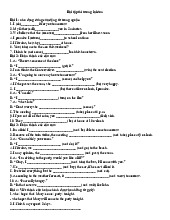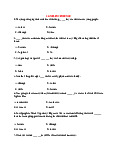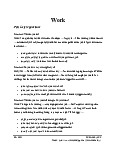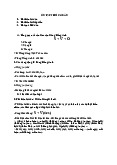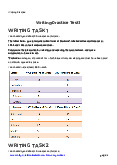

















Preview text:
HUE UNIVERSITY
UNIVERSITY OF FOREIGN LANGUAGES DEPARTMENT OF ENGLISH RESEARCH METHODS
EFFECTS OF INDIVIDUAL FACTORS AND COLLECTIVE
FACTORS ON THE QUALITY OF TEAMWORK OF FRESHMAN AT HUFLIS Researchers: Đinh Hiền Vy Lê Thị Hương Bùi Thị Huỳnh Trâm Lê Thị Thanh Xuân Group: 11
Instructor: Mrs. Tôn Nữ Như Ngọc TABLE OF CONTENTS: CHAPTER ONE: INTRODUCTION 2 1.1 Context: 2 1.2 Research topic: 2 1.3 Research questions: 2,3 CHAPTER TWO: LITERATURE REVIEW 3 2.1 Definition: 3 2.2 Advantages of teamwork: 3
2.3 Disadvantages of teamwork: 4 2.4 Individual factors: 4,5 2.5 Collective factors: 1 5
2.6 Previous research results: 5,6 CHAPTER THREE: METHODOLOGY 6 3.1. Subjects ( participant): 6 3.2. Data collection methods: 6,7 CHAPTER FOUR: LIST OF REFERENCES 7,8 CHAPTER ONE INTRODUCTION 1.1 . Context
- In today's modern life, teamwork is considered an important
requirement for all people. When the industrialization -
modernization economy begins to expand, the amount of knowledge
is growing, the requirements for the quality of people's work are
increasing and the need for teamwork becomes more necessary.
Especially for students - future generations are expected.
-In order to understand the current state of student teamwork, our
research team will focus on freshmen students who were studying
at HUFLIS during the past academic year, and how the factors 2
affected them. the effectiveness of students' group work such as
knowledge, skills, and working attitudes of individuals and groups. ( by Huong) Research aims:
- This study wants to help students better understand nature as
well as help them grasp the influencing factors and the degree of
influence of each factor so as to choose appropriate solutions to
improve the quality of life and teamwork. 1.2. Research topic:
“ Effects of individual factors and collective factors on the
quality of teamwork of freshman at HUFLIS”
1.3 Research questions
This issue to be discussed in this research are summarized in the following question:
Question 1: what are the individual factors that affect the quality of their teamwork?
Question 2: what are the collective factors that affect the quality of their teamwork?
Question 3: what should they do to improve the quality of their teamwork? (by Huong, Vy, Xuan, Tram) CHAPTER TWO 3 LITERATURE REVIEW 2.1 Definition
There are many different definitions of "teamwork" Scarnati (2001)
states: "“ teamwork is a co-operative process that allows ordinary
people to achieve extraordinary results’’. Harris (1996) explains that
teamwork is when "Members work together in pursuit of common goals,
thereby promoting individual strengths and developing relationships in a way that benefits all." Teamwork skills
become an important factor in learning as well as in large
projects of businesses, especially for current students. This is also the main
research topic that our team undertook to better understand what elements of the
individual and the collective factors have impacted the quality of teamwork of today's students. ( by Huong)
2.2 Advantages of teamwork
- Working together facilitates idea generation and creativity
- Teamwork improves productivity and brings better studied results
- Working in teams boost student morale and motivation
- When we work together, we learn faster - Teamwork relieves stress - Improve self-confidence
- Teaches essential social skills
2.3 Disadvantages of teamwork: -Individual conflicts -Uneven information sharing 4 -Lack of communication -Lack of interaction with work
-The number of members is too much
-The members' egos are too high ( by Xuan, Tram) 2.4 Individual factors: a) Knowledge and Skills:
Knowledge usually refers to information or awareness that
someone has about a subject, whether from education or
experience. Katzenbach & Smith (1993) asserted that, through
knowledge, “members in the group can present their opinions
clearly, actively listen and give useful suggestions to other people".
Skill is a person's ability/ability to master one or more actions with
the aim of producing the desired result. Parrish (2001) has argued
that a group needs to have complementary skills such as
professional skills as well as communication skills interpersonal
communication, problem-solving, and making decisions to be able
to work well together. Based on many previous studies, it has been
determined that: soft skills are more important than technical skills
are a necessary requirement for an employment successful group. b) Work attitude:
In a collective working environment, members should have positive
attitudes including working style and treatment with the rest of the
team. Romig (1996) believes that the member's good working
attitude is an important factor that has a positive effect on the
group's results. The associated values related to behavior and
behavior modification should be established early on in group 5
formation. Besides, Beatty & Barker-Scott (2004) said that the
group should build its own standards of working style and behavior
among members. This standard helps the team develop effective
methods of working together to deal with unacceptable behaviors
that may lead to discomfort for everyone or lead to poor group
performance) of the member. Individual needs are dominated by
the needs of the group (Hollenbeck, J. R., Ilgen, et al., 1995) If the
group of members is active, the individual will contribute a lively
opinion, while on the contrary, if the group is silent, without
comments from the members, the individual members of the group
will be timid, and dare not contribute opinions. ( by Vy) 2.5 Collective factors: a) Leader
A leader is someone who has responsibility for monitoring and
tracking progress work, paying attention to problems that arise to
promptly resolve possible errors that damage team performance.
Leaders need to understand their roles and points strengths and
weaknesses of the member’s group from which to communicate the
plan the best way. Good leadership positively affects effective
teamwork. According to Harris (2003), during the formation stage,
a very important factor that can determine the success of the group
is choosing a leader and the need to ensure the respect of members. b) Relationships
The actual relationship is the level of mental cohesion between the
members of the group. Beatty & Barker- Scott (2004) proposes that
groups have a good relationship and communication ability to use
brainstorming methods to clearly understand their goals,
processes, roles, and responsibilities, thereby better understanding 6
what they are trying to finish. In effective teams, members
communicate and work well together, while challenging each other
in a positive way to enhance learning opportunities volume (Hays, 2004). ( by Vy) 2.6 Previous research results:
A study conducted by Ferina (2015) showed that students who
were taught using cooperative learning learned and worked
together in groups, collaborated in understanding the learning
materials, and paid attention to the class presentation, which
resulted in increased student achievement. In another study,
Jamaludin and Mokhtar (2018) revealed that cooperative learning
improves students’ achievement, in which they were reported as
more focused and motivated because their roles in the group were recognized by peers.
Our study found that group members help each other in achieving
the mutual goal. This action then leads students to be more active
in learning, which in turn increases classroom participation. ( by Vy) CHAPTER THREE METHODOLOGY
3.1. Subjects ( participant)
- The freshman are studying at HUFLIS university ( about 20 students )
3.2. Data collection methods: 7
During the research, we have used some of system methods in the following:
- Using Questionnaire : Set up a number of multiple choice
questions about students' group work, which will include 50%
of closed questions, and the remaining 50% of questions is
open form. The questions will relate to factors that individuals
and collectives often encounter and how they have affected the teamwork process. - Open question :
+ Do you often work in groups at your school?
+ What was the hardest thing for you personally about group work?
+ What do you think is most important when working in groups?
+ Do you find that it is challenging when you have group work?
+ Have you seen more attitudes of members when doing
teamwork? (negative or positive attitude)
+ How do you feel when a person lacks responsibility or does not participate in work?
+ Do you think it is actually effective when you work in a group? ( by Huong, Vy, Tram) CHAPTER FOUR LIST OF REFERENCES
Katzenbach, H., & Smith, A. (1993), The effect of personality type on team 8
performance. Journal of Management Development, 16(5), pp. 337-353
Hollenbeck, J. R., Ilgen, D. R., Sego, D. J., Hedlund, J., Major, D. A., & Phillips, J.
(1995). Multilevel theory of team decision making: Decision performance in
teams incorporating distributed expertise. Journal of Applied Psychology, 80, 292- 316.
Romig, A.G. (1996), The relation between group cohesiveness and performance: An
integration. Psychological Bulletin, pp. 210-227.
Parrish, J. (2001), Does diversity affect group efficacy? The intervening role of
cohesion and task interdependence. Small Group Research, 32(4), pp. 426-450.
Harris, R.P. (2003), ‘Managing effectively through teams’, Team Performance
Management: An International Journal, 2(3), pp. 23-36.
Hays (2004), Building high-performance teams: A practitioner’s guide, Canberra: Argos Press.
Beatty, H., & Barker, S. (2004), Teamwork as an essential component of high-
reliability organizations, Health Services Research, 41(4), 1576-1598.
Jamaludin, M. & Mokhtar, M. F. 2018. Students team achievement division.
International Journal of Academic Research in Business and Social Sciences 8(2): 570-577.
Hackman, J.R. (1983), A normative model of work team effectiveness, New Haven:
Yale School of Organization and Management.
Nguyen Thi Minh Hien ( 2020), ‘ Khảo sát thực trạng làm việc nhóm của trường đại
học Hồng Đức’ , Tạp chí Giáo dục, Số đặc biệt kì 2 tháng 5/2020, trang 244-248
Nguyen Thi Hoa ( 2016), ‘ Thực trạng kỹ năng học tập theo nhóm của sinh viên
trường Đại học Sư Phạm Hà Nội ’, Nghiên cứu thuộc Đại học Sư Phạm Hà Nội
Những khó khăn khi làm việc nhóm. (2022, July 27). Retrieved from 9
https://www.tanca.io/blog/nhung-kho-khan-khi-lam-viec-nhom-va-huong-giai- quyet
Reference citation: (“Những khó khăn khi làm việc nhóm ,” 2022)
Trương Thị Hoa. (2016, October 27). Thực trạng kỹ năng làm việc nhóm của sinh
viên. Retrieved from http://vjes.vnies.edu.vn/sites/default/files/133_10.2016_-77- 80.pdf
Reference citation: (Trương Thị Hoa, 2016)
Loop Team. (2020, April 20). 7 Advantages of Teamwork. Retrieved from
https://www.intheloop.io/blog/advantages-of-teamwork/
References citation: (Loop Team, 2020)
Four Benefits of Teamwork for Student Development & Success. (2019, October 15). Retrieved from https://www
.marlborough.org/news/~board/stem/post/four-
benefits-of-teamwork-for-student-development-success
References citation: (“Four Benefits of Teamwork,”2019) ( By, Huong, Vy, Xuan, Tram) 10 II. Literature review
Today, along with the development of modern science and
technology. The fields of education and business - cooperation are
growing and demanding, and higher demands for quality and
benefits. Teamwork skills become an important factor in learning as
well as in large corporate projects. Especially for today's students.
This is also the main topic of research that our team carried out to
better understand what individual and collective factors have
affected the quality of teamwork among students today. Right from
the time they were still in school, this skill was considered a
particularly important and necessary factor for young people - the
seeds of knowledge that are expected in the future. Therefore, this
leads to an urgent requirement on how to improve the quality and
effectiveness of group work for students - the promising generation
of the country. According to some observations, in Vietnam, group
work is known as a method but has not yet become a widely applied
form of learning. Besides, students' working skills are still limited
and not effective. For example, according to the survey results in
the study "The reality of group study skills of students at Hanoi 11
National University of Education" conducted in 2016 by the Hanoi
National University of Education, the results Students' group work
is done at a low level of only 2.22 pts (Nguyen Thi Hoa, 2016).
Therefore, to better understand which individual and collective
factors have affected the results as well as the quality of teamwork,
our research team has relied on the specific context and conditions
to conduct a study on 100 first-year students studying at Hue
University of Foreign Languages. The study wishes to help students
better understand the nature of and grasp the influencing factors
and the degree of influence of each factor on the process of
teamwork as well as the quality of students' teamwork.
There are different definitions of “teamwork”. Scarnati (2001)
states that “teamwork is a collaborative process that enables
ordinary people to achieve extraordinary results” and Harris (1996)
explains that teamwork is when “members cooperate with each
other to pursue a common goal, thereby leveraging the strengths of
each individual and developing relationships in a way that benefits
all”. In fact, a few years ago, there were quite a few research
methods created by researchers for the purpose of group research.
The study based on the IPO model is a research method on group
efficiency of the author Hackman, 1983) with the form of selecting
6 suitable factors to evaluate. Assess their impact on students'
teamwork performance including knowledge, skills (individual),
leadership attitudes, relationships, science and technology, and
support. It can be considered the most exemplary model to
comprehensively evaluate the working process as well as the
working quality of the group. Hackman's research results have
shown that 3 groups of input factors have a positive impact on the
team's performance. In addition, there are several approaches to
research on group effectiveness, which are direct research 12
approaches using the questionnaire method. Questionnaires have
an advantage over some other types of survey tools in that they are
cheap, require little effort from a questionnaire like verbal or
telephone surveys, and often have standardized responses and
making data aggregation simple. It can also distinguish between
questionnaires with questions that measure individual variables
and questionnaires with questions aggregated into scales or
indicators. One of the largest questionnaires was the questionnaire
of (Dean Milles, 1975). This method also received many positive
results because it gave very specific survey results. For example,
using a questionnaire to survey the situation of teamwork at Hong
Duc University, 2020 (Education Journal, special issue), May 2,
2020, pp. 244-248) clarifying the survey results on the status of
students' group work in order to draw the most positive conclusions
about student group work. Through the above two methods, our
research team has relied on objective aspects, appropriate
conditions, and contexts to choose the most effective method for
the research problem. It is to use a closed-open combination
questionnaire (Dean Milles, 1975) to research individual and
collective factors affecting the quality of teamwork, from which to
draw the main conclusions. most accurate and relevant to the
problem. At the same time, our method is based on the influencing
factors of the IPO method (Hackman, 1983) to conduct appropriate
questions for students to help students identify questions in a
timely, effective, and easier way.
Based on the form of research in the form of an IPO model (hackman, 1983) using
individual factors, collective factors affecting the interaction process in the group.
Although the research results according to this model of Hackman have a positive
impact on the effectiveness of teamwork, many later studies have been based on
Hackman's basic framework to research and re-test but the results of selecting The 13
input variable are different. In Vietnam, the volume of research papers on team
effectiveness in the form of IPOs is not much. In the previous research models studied
by the research team (Dang Ngoc Thao and team, 2021) of the Institute of Commerce
& National Economy, National Economics University, only 3 studies used the research
framework. This paper includes author Huynh Thi Minh Chau (2015) with the topic
"Theory model of team effectiveness in Vietnamese enterprises". The remaining
studies mainly follow the traditional model. Although there are inheritances from
foreign studies and selections and additions, the use of too many such factors can
cause difficulties in the research process, leading to a lack of selectivity. Most
importantly, the science and technology factor is considered an exogenous factor and
has no impact on the working process, which goes against the perception that "the
development of the 4.0 revolution is getting stronger and stronger", and affects all
areas of life” (D. Caspersz, 2013) especially in the field of education for students
about teamwork skills. To match the research process, our research team based on the
IPO model, only selected 4 factors including skills and knowledge of individual
factors, leadership, and working attitude of collective factors. After conducting
research in the most specific way, and through the use of questionnaires to evaluate
the process as well as the quality of students' teamwork.
First, Knowledge generally refers to information or perception someone has about a
subject, whether from education or experience. Katzenbach & Smith (1993) asserts
that, through knowledge, "group members can express their opinions clearly, actively
listen, and give useful suggestions to others".
Skill is a person's ability to master one or more actions to produce a desired result.
Parrish (2001) argued that a team needs to have complementary skills such as
technical skills as well as interpersonal skills: interpersonal communication, problem-
solving, and decision-making to be able to work well together. Based on many
previous studies, it has been determined that soft skills are more important than
technical skills and are a requirement for teams to succeed in teamwork.
Second, For the collective factor, the leader is the person responsible for monitoring 14
and monitoring the work progress
, concerning arising issues to promptly resolve
errors that may affect the team 's work
efficiency. The leader needs to understand his
role and point out strengths, weaknesses of the group members to communicate the
plan in the best way. Good leadership positively affects teamwork performance.
According to Harris (2003), during the formative stage, a very important factor that
can determine the success of the team is the choice of leader and the need to ensure
the respect of its members. Besides, actual relationships are the level of mental
cohesion between team members. Actual relationships are the level of mental cohesion
between team members. Beatty & Barker- Scott (2004) proposed that teams with good
relationships and communication abilities should use brainstorming methods to clearly
understand the goal, their processes, roles, and responsibilities, thereby better
understanding what they are trying to accomplish. In effective teams, members
communicate and work well together, and challenge each other in positive ways to
enhance learning opportunities (Hays, 2004).
Besides, using research form based on specific factors affecting
group quality including awareness, communication skills, trust.
When students' perceptions of teamwork were influenced by
individual factors, this perception influenced their performance as
team members. The influence of personality and communication
characteristics on students' perception is the cause of the quality of
teamwork (Myers et al., 2009). DeRosa and Lepsinger (2010); M. K.
Smith (2003, 2009), and Rovai (2002) emphasize the importance of
communication skills in achieving positive outcomes in group
learning and point out the importance of building trust among
members team members and connecting with each other by
reducing the social distance to enhance communication. However,
the use of an authoritative tone by one or more members fails to
communicate, excludes one or more team members, and
demonstrates a lack of trust in communication. Other studies have
illustrated that students' perceptions of teamwork can change 15
depending on students' experiences in groups. Goold, Augar, and
Farmer (2006) demonstrated how students' perceptions of
teamwork fluctuated throughout the study period. According to
Johnson et al. (1991) and Johnson, Johnson, and Holubec (1998),
positive interdependence refers to the belief that each group
member depends on the contributions of others and that all
members have three Common goals that can only be achieved by
working together. When students have a clear understanding of
positive interdependence, they understand that each team
member's efforts are necessary and integral to the team's success
and that each team member has his or her contribution to make. for
joint efforts (Johnson et al., 1998). The results of this study are
based on five essential pillars for building effective teamwork.
According to Johnson et al. (1991), this is the most important but
also the most challenging thing to do in learning teamwork.
Through this research method, it is shown that the factors of
individual factors and collective factors are the main factors
affecting the process as well as the quality of students' teamwork.
Besides, we realized that there are still some gaps in the research
issue that have not been clarified yet. Some study results are still
not exactly the same because the factors of the studies may be
different or it may be due to several other reasons. However, the
common point between the research papers which can solve all the
problems researched and come to a clear factual conclusion to the
research problem. These studies have played a part in our
research. In addition, thanks to the evaluation of the results of
many studies, we have come up with appropriate methods and
questions to apply to the research process, simultaneously helping
us avoid problems that are unrelated to our research. 16 17
